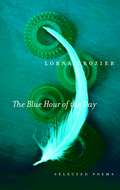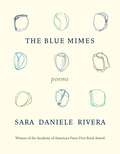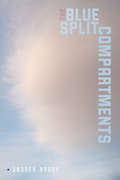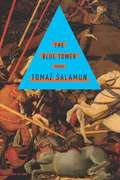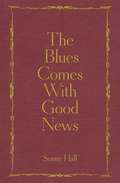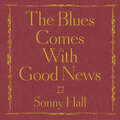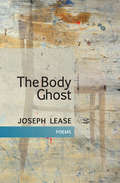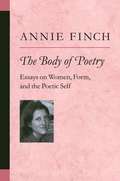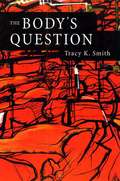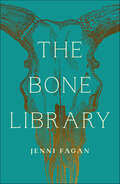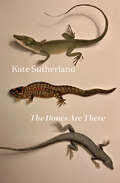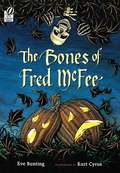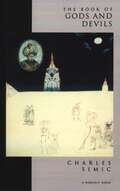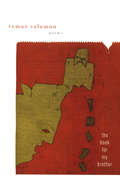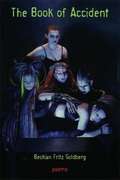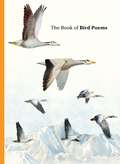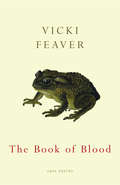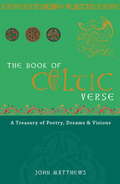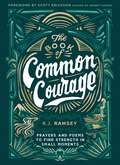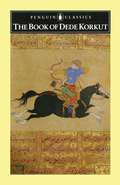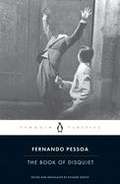- Table View
- List View
The Blue Hour of the Day: Selected Poems
by Lorna CrozierOver the course of a career spanning three decades, Lorna Crozier has become one of Canada's most beloved poets, receiving high acclaim and numerous awards, including the Governor General's Award, the Pat Lowther Poetry Award, and the Canadian Authors Association Award. Now, in this definitive selection of poems, which draws on her eight major collections and includes many of the poems for which she is justly celebrated, Crozier's trademark investigations of family, spirituality, love's fierce attachments, and bereavement and loss have been given a new framework. As a sapphire generates a blue light from within, The Blue Hour of the Day demonstrates Crozier's dazzling capacity to bring depths to light, unfailingly and unflinchingly. It represents the best work of an icon of Canadian poetry.From the Trade Paperback edition.
The Blue Mimes: Poems
by Sara Daniele RiveraSara Daniele Rivera’s award-winning debut is a collection of sprawling elegy in the face of catastrophic grief, both personal and public. From the lead-up to the 2016 presidential election through the COVID-19 pandemic, these poems memorialize lost loved ones and meditate on the not-yet gone—all while the wider-world loses its sense of connection, safety, and assurance. In those years of mourning, The Blue Mimes is a book of grounding and heartening resolve, even and especially in the states of uncertainty that define the human condition.Rivera’s poems travel between Albuquerque, Lima, and Havana, deserts and coastlines and cities, Spanish and English—between modes of language and culture that shape the contours of memory and expose the fault lines of the self. In those inevitable fractures, with honest, off-kilter precision, Rivera vividly renders the ways in which the bereft become approximations of themselves as a means of survival, mimicking the stilted actions of the people they once were. Where speech is not enough, this astonishing collection finds a radical practice in continued searching, endurance without promise—the rifts in communion and incomplete pictures that afford the possibility to heal.
The Blue Split Compartments (Wesleyan Poetry Series)
by Andrea BradyThe Blue Split Compartments is a complex and powerful sequence of lyric poems exploring how the physically intimate relationships between military drone operators and their victims are mediated, not only through the technological interfaces of the screen and drone, but also through language and subjectivity. Drawing on chatroom logs, military policy manuals, pattern of life archives, and accounts by witnesses around the world, these poems document the consequences of the perpetual and 'everywhere war' conducted from remote airbases, where pilots in shipping containers surveil and destroy remote 'objects'. Brady's approach offers a sophisticated interplay of diction, rhetoric, syntax, positioning, allusion, and sonic quality that generates legible currents of meaning and orientation. Entire countries have been turned into 'open air prisons', where the buzzing of drones overhead induces profound trauma and changes to social life. These poems strafe a documentary history of drone warfare with personal memory, and reflections on the myths and mechanics of prosthetic violence, voyeurism, masculinity, and desire. The Blue Split Compartments is a bitter comedy in drone erotics, a devastating reach into the twisted soul of murderous techno-surveillance regimes, a linguistically virtuosic and deeply humane x-ray of the discursive and militaristic systems that join us in mutual dissolution.
The Blue Tower
by Tomaz Salamun Michael BigginsThe work of this "eminent, still-wild spirit of Central Europe" (Publishers Weekly) continues to electrify. In The Blue Tower, language is remade with tenderness and abandon: "Rommel was kissing heaven's dainty hands and yet / from his airplane above the Sahara my uncle / Rafko Perhauc still blew him to bits." There is an effervescence and a sense of freedom to Tomaž Salamun's poetry that has made him an inspiration to successive generations of American poets, "a poetic bridge between old European roots and the American adventure" (Associated Press). Trivial and monumental, beautiful and grotesque, healing, ferocious, mad: The Blue Tower is an essential volume.
The Blue and the Gray
by Eve BuntingAs a black boy and his white friend watch the construction of a house which will make them neighbors on the site of a Civil War battlefield, they agree that their homes are monuments to that war.
The Blues Comes With Good News: The perfect gift for the poetry lover in your life
by Sonny HallSoul searching poetry for a new generation.Inspired by Diane di Prima, Rene Ricard, Henry Miller and others 'who tell it like it is', The Blues Comes with Good News is a collection of poems by prolific writer, Sonny Hall. The collection ranges from articulating addiction, self-destruction and identity, to romantic relationships, his journey to recovery and his unapologetic depiction of truth, through life and its happenings. At 18 years old Sonny entered a treatment centre for alcohol and drug addiction, after losing his biological mother - who he remained close to despite being adopted aged 4 - to a heroin overdose. Three months into his treatment, Hall started writing poems as a way of ordering 'all the madness' in his head. He has since written hundreds of poems, which all portray his newfound intimacy with life, figuring it out as he goes on, never failing to write sincerely about the sting of life, through a rare candour, explicit and seedy within the realms of his own indulgence. Illustrations by JACK LAVER
The Blues Comes With Good News: The perfect gift for the poetry lover in your life
by Sonny HallSoul searching poetry for a new generation.Inspired by Diane di Prima, Rene Ricard, Henry Miller and others 'who tell it like it is', The Blues Comes with Good News is a collection of poems by prolific writer, Sonny Hall. The collection ranges from articulating addiction, self-destruction and identity, to romantic relationships, his journey to recovery and his unapologetic depiction of truth, through life and its happenings. At 18 years old Sonny entered a treatment centre for alcohol and drug addiction, after losing his biological mother - who he remained close to despite being adopted aged 4 - to a heroin overdose. Three months into his treatment, Hall started writing poems as a way of ordering 'all the madness' in his head. He has since written hundreds of poems, which all portray his newfound intimacy with life, figuring it out as he goes on, never failing to write sincerely about the sting of life, through a rare candour, explicit and seedy within the realms of his own indulgence. Illustrations by JACK LAVER(P) 2019 Hodder & Stoughton Ltd
The Body Ghost: Poems
by Joseph LeaseIn this “spare, evocative” collection of poems from the prize-winning author of Testify, “both hope and despair are evident amid [the] music” (Publishers Weekly). “Promise me the rich can’t sleep,” Joseph Lease begs in The Body Ghost, offering poems as light on the page as nursery rhymes, and as powerful as prayer. The title work, which is “broken up into three separate poems, underlines the common thread weaved throughout his collection, the search for a silver lining amongst hardships” (Fourteen Hills). “Electric and electrifying, spontaneous and illuminating,” these poems conjure up the body in pain, the body politic in collapse, and the strength of all that connect us (Tablet).
The Body of Poetry
by Annie FinchThe Body of Poetry collects essays, reviews, and memoir by Annie Finch, one of the brightest poet-critics of her generation. Finch's germinal work on the art of verse has earned her the admiration of a wide range of poets, from new formalists to hip-hop writers. And her ongoing commitment to women's poetry has brought Finch a substantial following as a "postmodern poetess" whose critical writing embraces the past while establishing bold new traditions. The Body of Poetry includes essays on metrical diversity, poetry and music, the place of women poets in the canon, and on poets Emily Dickinson, Phillis Wheatley, Sara Teasdale, Audre Lorde, Marilyn Hacker, and John Peck, among other topics. In Annie Finch's own words, these essays were all written with one aim: "to build a safe space for my own poetry. . . . [I]n the attempt, they will also have helped to nourish a new kind of American poetics, one that will prove increasingly open to poetry's heart." Poet, translator, and critic Annie Finch is director of the Stonecoast low-residency MFA program at the University of Southern Maine. She is co-editor, with Kathrine Varnes, of An Exaltation of Forms: Contemporary Poets Celebrate the Diversity of Their Art, and author of The Ghost of Meter: Culture and Prosody in American Free Verse, Eve, and Calendars. She is the winner of the eleventh annual Robert Fitzgerald Prosody Award for scholars who have made a lasting contribution to the art and science of versification.
The Body's Question: Poems
by Kevin Young Tracy K. SmithThe debut collection by the Poet Laureate of the United States* Winner of the 2002 Cave Canem Poetry Prize *You are pure appetite. I am pureAppetite. You are a phantomIn that far-off city where daylightClimbs cathedral walls, stone by stolen stone. --from "Self-Portrait as the Letter Y"The Body's Question by Tracy K. Smith received the 2002 Cave Canem Poetry Prize for the best first book by an African-American poet, selected by Kevin Young. Confronting loss, historical intersections with race and family, and the threshold between childhood and adulthood, Smith gathers courage and direction from the many disparate selves encountered in these poems, until, as she writes, "I was anyone I wanted to be."
The Bone Library
by Jenni FaganThese poems are alive with electricity, pulsating with a frequency that vibrates throughout. In a journey from there to here, The Bone Library examines and interprets all of human life. Throughout the collection Jenni Fagan responds to broader themes of identity, of place, of love and the unloved. Written in the old Dick Vet Bone Library during the author’s time as writer-in-residence there, this is a vivid exploration that is honest and searching and cuts to the very core of what it is to be alive.
The Bones Are There
by Kate SutherlandZigzagging across the globe, Kate Sutherland's fourth book is poetry by way of collage: pieced-together excerpts from travellers' journals, ships' logs, textbooks and manuals, individual testimony, and fairy and folk tales that tell stories of the extinction of various species, and of the evolution of human understanding of—and culpability for—the phenomenon. Across its three sections, Sutherland draws identifiable connections between various animal extinctions and human legacies of imperialism, colonialism, capitalism, and misogyny, charting the ways in which they juxtapose one another while impacting the natural order of things.A trenchant critique of humanity's disastrous effects on this world, The Bones Are There is also a celebration of incredible creatures, all sadly lost to us. It honours their memory by demanding accountability and encouraging resistance, so that we might stave off future irrevocable loss and preserve what wonders that remain.
The Bones are There
by Kate SutherlandZigzagging across the globe, Kate Sutherland’s fourth book is poetry by way of collage: pieced-together excerpts from travellers’ journals, ships’ logs, textbooks and manuals, individual testimony, even fairy and folk tales that tell stories of extinction—of various species, and of our own understanding of, and culpability within, its process. Across its three sections, Sutherland draws identifiable connections between various animal extinctions and human legacies of imperialism, colonialism, capitalism, and misogyny, charting the ways in which they juxtapose one another while impacting the natural order of things.As much as it is a critique of humanity’s disastrous effects on this world, The Bones Are There is also a celebration of such incredible creatures, all sadly lost to us. It honours their memory by demanding accountability and encouraging resistance, so that we might stave off future irrevocable loss and preserve what wonders that remain.
The Bones of Fred McFee
by Eve BuntingA rhyming story about a toy skeleton at Halloween that provides menace and mystery.
The Book Of Folly
by Anne SextonAnne Sexton (November 9, 1928, Newton, Massachusetts - October 4, 1974, Weston, Massachusetts) was an American poet, known for her highly personal, confessional verse. She won the Pulitzer Prize for poetry in 1967. Themes of her poetry include her suicidal tendencies, long battle against depression and various intimate details from her private life, including her relationships with her husband and children.
The Book Of Gods And Devils
by Charles SimicLoneliness, loss, sadness, and mystery mark this wonderful volume of forty-nine poems by Charles Simic, winner of the 1990 Pulitzer Prize for Poetry and praised as “one of the truly imaginative writers of our time” by the Los Angeles Times.
The Book for My Brother
by Tomaz SalamunThis newest collection of poems from Tomaž Šalamun is exuberant, ambitious, and full of surprises. Here the devil is encountered and understood-I see the devil's head, people, I see his whole body . . . he longs for innocence, as we do. Here the poet juggles many tones, languages, and countries. Desire is evoked as both frustrating and exhilarating-I'm watered by longing, knocking myhead into the wall, on the ground, or I burn, burn,folded up on the couch.And memory comes back to remind us of the laws and experiences of childhood-Once again you are let loose in the seaonly after five o'clock in the afternoon to takea dose of sunlight like the ticking of the clock.At once daring and clear-voiced, The Book for My Brother is an extraordinary achievement.
The Book of Accident
by Beckian Fritz GoldbergIn her latest collection of poems, The Book of Accident, Beckian Fritz Goldberg invites the reader into a shadowy atmosphere where her language prowls among strange images; hummingbirds become a fistful of violet amphetamines and desire gnaws away like a live rat sewed up inside us. Reading The Book of Accident is like entering a graphic novel with missing panels, a noir world of queasy glints and feral adolescents, a world where no one has to love you. Characters go by odd names: Torture Boy, Skin Girl, Lala Petite, Wolf Boy (his body pale as the plucked end of light). They are punk kids fending for themselves in an expressionistic version of those old stories that began, Let's take the children out to the woods / and leave them. And on every page, there's Goldberg's hard-edged wit, with the speed and flash of a video game. These poems show mercy but give no ground. They make you feel heartbroken and frightened and exhilarated at the same time.
The Book of Bird Poems
by Ana SampsonThe wonder of birds has charmed and inspired poets down the centuries and across the globe. From Shakespeare's 'feathr'd king' to Ted Hughes 'butterfly lightness', of swifts, this is a collection to stir the soul of any nature lover. Our emotional and cultural connection to the bird world is captured in 60 of the best-loved poems, which include the work of Percy Shelley, Edgar Allan Poe, Longfellow and Keats. All of them accompanied by the beautiful bird illustrations of Ryuto Miyake. From the common robin to the soaring eagle, from the chattering parrot to the sinister crow.This anthology will help us see our flighted cousins in a new light and confirm why they feature so much in our art, folklore and literature. They are indeed, poetry in motion.
The Book of Bird Poems
by Ana SampsonThe wonder of birds has charmed and inspired poets down the centuries and across the globe. From Shakespeare's 'feathr'd king' to Ted Hughes 'butterfly lightness', of swifts, this is a collection to stir the soul of any nature lover. Our emotional and cultural connection to the bird world is captured in 60 of the best-loved poems, which include the work of Percy Shelley, Edgar Allan Poe, Longfellow and Keats. All of them accompanied by the beautiful bird illustrations of Ryuto Miyake. From the common robin to the soaring eagle, from the chattering parrot to the sinister crow.This anthology will help us see our flighted cousins in a new light and confirm why they feature so much in our art, folklore and literature. They are indeed, poetry in motion.
The Book of Blood
by Vicki FeaverSplit between dark and light, this book records the dichotomy of human experience with unflinching force and clarity. It deals with break-up, depression, illness and death. But it also reveals an intense involvement with nature and a capacity for healing and love. There are intimate personal poems reflecting on relationships with people and creatures; poems which enter the lives of real and imaginary characters, Keats and Medea and Blodeuwedd, for example; and also poems which engage with paintings and political events.Set in a territory which connects child with adult, myth with reality, the personal with the universal, the book shows a poet fully open to the richness and possibilities of the world but also aware of its violence and pain, not as a remote observer but as someone who is a part of it.
The Book of Celtic Verse
by John MatthewsAn inspirational collection of Celtic Poetry compiled by the leading authority on the Celtic tradition.
The Book of Common Courage: Prayers and Poems to Find Strength in Small Moments
by K.J. RamseyThe Book of Common Courage is a collection of prayers, poems, and blessings to help you find a flicker of strength in the small and hard moments of life. Beloved author and therapist K. J. Ramsey invites you to journey word-by-word through Psalm 23 to experience how the Good Shepherd is with you and for you, especially in the valleys of life. When you struggle to find the words to hold your pain or trauma, be encouraged to cultivate the compassion and courage to believe that your story will, in fact, end in joy.Through K. J.'s lyrical and emotive writing, you are invited to:Surrender your anxiety and your tears to a faithful GodValidate your emotions and embrace them as the gift they areSlow down and remember that good will come againReplenish your soul with the life of Christ and the promises of GodRefresh your faith with a peace that lastsExperience newfound confidence in prayerRemember that even when pain is not past-tense, God is still present Courage is a common hope that we can cultivate together. These prayers and poems can be read in group settings--among friends, families, and worshipping communities--and are also ideal for personal reflection.Inside, you will find:Colorful still life and nature photographyPrayers, poems, and blessingsA ribbon marker This is a gorgeous gift to give for Easter, Christmas, birthdays, during a time of loss, during a life transition, or when looking for a new church community.
The Book of Dede Korkut
by Geoffrey LewisThe Book of Dede Korkut is a collection of twelve stories set in the heroic age of the Oghuz Turks, a nomadic tribe who had journeyed westwards through Central Asia from the ninth century onwards. The stories are peopled by characters as bizarre as they are unforgettable: Crazy Karchar, whose unpredictability requires an army of fleas to manage it; Kazan, who cheerfully pretends to necrophilia in order to escape from prison; the monster Goggle-eye; and the heroine Chichek, who shoots, races on horseback and wrestles her lover. Geoffrey Lewis's classic translation retains the odd and oddly appealing style of the stories, with their mixture of the colloquial, the poetic and the dignified, and magnificently conveys the way in which they bring to life a wild society and its inhabitants. This edition also includes an introduction, a map and explanatory notes.
The Book of Disquiet
by Fernando PessoaFernando Pessoa was many writers in one. He attributed his prolific writings to a wide range of alternate selves, each of which had a distinct biography, ideology, and horoscope. When he died in 1935, Pessoa left behind a trunk filled with unfinished and unpublished writings, among which were the remarkable pages that make up his posthumous masterpiece, The Book of Disquiet, an astonishing work that, in George Steiner's words, "gives to Lisbon the haunting spell of Joyce's Dublin or Kafka's Prague." Published for the first time some fifty years after his death, this unique collection of short, aphoristic paragraphs comprises the "autobiography" of Bernardo Soares, one of Pessoa's alternate selves. Part intimate diary, part prose poetry, part descriptive narrative, captivatingly translated by Richard Zenith, The Book of Disquiet is one of the greatest works of the twentieth century.
